|
|
|
Sort Order |
|
|
|
Items / Page
|
|
|
|
|
|
|
| Srl | Item |
| 1 |
ID:
147163
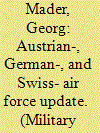

|
|
|
| 2 |
ID:
093765
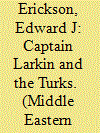

|
|
|
|
|
| Publication |
2010.
|
| Summary/Abstract |
The voyages of the HMS Doris along the Mediterranean coast near Alexandretta (modern Iskenderun, Turkey) in the winter of 1914-15 had a dramatic effect on the Ottoman Empire that far exceeded the scope of the operations. This article uses British, German, and Turkish archival sources to focus on the ship's operations in the vicinity of Dortyol and on the strategic impact these had on Ottoman perceptions of threats to the empire. The Doris figures prominently in two critical strategic outcomes - the relocation of the Armenians in 1915 and in the activation of three Ottoman army divisions for coastal defence and internal security.
|
|
|
|
|
|
|
|
|
|
|
|
|
|
|
|
| 3 |
ID:
103800
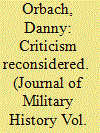

|
|
|
| 4 |
ID:
091049
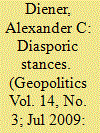

|
|
|
|
|
| Publication |
2009.
|
| Summary/Abstract |
This essay explores the historical geographic antecedents of migration decisions among Koreans and Germans in Kazakhstan as evidence of the importance of space-time approaches to socio-political phenomena. Both groups came to Central Asia under similar circumstances as 'punished peoples' but reacted very differently to Kazakhstan's independence. Koreans have largely opted to remain in Kazakhstan and re-imagine themselves as hybrid members of the Korean diaspora and the Kazakhstani civic nation. The majority of Germans, by contrast, have opted to migrate to Germany and abandon Kazakhstan. I argue that despite significant similarities in their historical geographic experiences within Tsarist Russia and the USSR, the unique spatio-temporal biographies of each group have configured their respective homeland conceptions differently. Contingency, rather than some a priori pattern of territorialisation, is clearly evident in each group's receptivity to migration possibilities.
|
|
|
|
|
|
|
|
|
|
|
|
|
|
|
|
| 5 |
ID:
170964
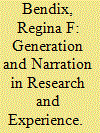

|
|
|
|
|
| Summary/Abstract |
"It is not talked about” and “you do not hear about it” are among the comments made by my colleagues in Israel regarding 1967 or the Six-Day War when they approached me to participate in this project with them. Whether a short or a non-war, as some interviewees characterized it, June 5th and the subsequent days of 1967 changed the lives of Israelis and Palestinians profoundly. Thus, I embarked on a joint project together with Prof. Aziz Haidar and Prof. Hagar Salamon. Our undertaking rests on the conviction that an interview project focused on posing the question ‘how did this war impact everyday lives?’ to individuals from all walks of lives, ethnic and/or national affiliation,gender, and political conviction contributes in important ways to much needed conversations in present day Israel/Palestine: there is little to no knowledge among the two main groups regarding the other’s perception of the events, and there are many deeply rooted assumptions about each other which such a project can bring into common discourse. Occupation and settlements, wars and uprisings over the past decades all have as a backdrop the new territorial situation brought about by 1967. The individual and familial everyday experience of the war and its subsequent impact deserve to be spelled out in their very diversity and be brought to a public awareness that all too easily sees but two sides rather than millions of lives and complicated biographies with specific accommodations to a territorial, familial, and economic situation. We decided to initiate a project that focused on personal stories which we hoped to bring into the public sphere to demonstrate that the historical master narratives told about 1967 in Israel/Palestine are an oversimplification.
|
|
|
|
|
|
|
|
|
|
|
|
|
|
|
|
| 6 |
ID:
086806
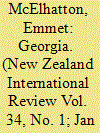

|
|
|
|
|
| Publication |
2009.
|
| Summary/Abstract |
Adlai Stevenson's comment that most wars break out on the confused and disputed boundaries of changing power systems has resonance after recent events in the Caucasus.From the moment in 1989 when the East German regime began banning some publications from glasnost soviet Union for being too liberal to some undefined moment encapsulated by Vladimir Putin's Fulton speech in February 2007.
|
|
|
|
|
|
|
|
|
|
|
|
|
|
|
|
| 7 |
ID:
166757
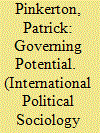

|
|
|
|
|
| Summary/Abstract |
Many scholars of international political sociology have turned to biopolitics in their attempts to understand the “European migration/refugee crisis” that has unfolded in and around the Mediterranean Sea in the last several years. This article makes an intervention into this debate by suggesting a new means of understanding the biopolitics of migration and refugee management, based on a detailed consideration of the role of potentiality in biopolitical governance. After first discussing current understandings of potentiality within biopolitical literatures, and the analyses of migration and refugee governance they suggest, the article engages in a reading of Agamben's recent work The Use of Bodies, in order to develop a new understanding of life's potential within biopolitical logics as potential toward the “correct use” of bodies. This allows for a focus on biopolitical practices of incorporation and inclusion which goes beyond analyses of the acts of securitization or abandonment that only partially characterize reactions to the movement of people across the Mediterranean Sea. This understanding is employed to provide fresh insights into one of the defining responses to the “European migration/refugee crisis”: the “open-door” migration and refugee policy pursued by the German government under Chancellor Angela Merkel from the summer of 2015 onward.
|
|
|
|
|
|
|
|
|
|
|
|
|
|
|
|
| 8 |
ID:
097518
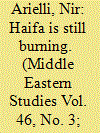

|
|
|
|
|
| Publication |
2010.
|
| Summary/Abstract |
The air raids against civilian and military targets during the Second World War have been a relatively unexplored chapter in Palestine's tumultuous history. This article examines the circumstances that led the air forces of Italy, Germany and Vichy France to launch attacks against Palestine. It surveys the damage these raids caused and assesses their effect on the country's population. The article raises three central arguments: although the attacks caused considerable damage in Haifa and in Tel Aviv, they failed to alter the course of the war in the Middle East; despite the hostility between Arabs and Jews before and after the war, the period of the air raids saw displays of solidarity between the two communities; and the experiences of the Second World War, including the air raids, played a part in the state-building process of the Yishuv (Jewish community).
|
|
|
|
|
|
|
|
|
|
|
|
|
|
|
|
| 9 |
ID:
170953
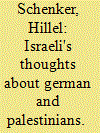

|
|
|
|
|
| Summary/Abstract |
My first contact with Holocaust survivors was when I joined Kibbutz Barkai in 1963. The founders of the kibbutz, members of the socialist-left Zionist Hashomer Hatzair youth movement, were all Holocaust survivors from Poland and Romania. Most had survived the horrors of the concentration camps, while a few had escaped and joined the Red Army or partisans fighting the Nazis. They came to the fledgling State of Israel to rebuild their broken lives.
|
|
|
|
|
|
|
|
|
|
|
|
|
|
|
|
| 10 |
ID:
137592
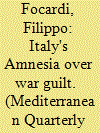

|
|
|
|
|
| Summary/Abstract |
The Italian national memory has still not come to terms with the responsibilities of Benito Mussolini's Italy for the Axis war of 1940 – 43, which Italy fought on the side of Nazi Germany. It has also not come to terms with the serious war crimes Italy committed in the occupied territories, especially the Balkans. Instead, a master narrative elaborated the positive stereotype of the “good Italian,” an opponent of war and a savior of the Jews, in contrast to the negative stereotype of the “evil German,” sadistic and brutal, onto whom the Italians shifted all the blame for the war. This essay analyzes the origin of these interwoven stereotypes, which were created by the Italian ruling class in order for the defeated nation to avoid a punitive peace and were subsequently spread by the mass media.
|
|
|
|
|
|
|
|
|
|
|
|
|
|
|
|
| 11 |
ID:
141568
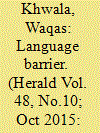

|
|
|
| 12 |
ID:
091083


|
|
|
|
|
| Publication |
2009.
|
| Summary/Abstract |
While the literature on trust has produced various conceptual models, there is also some confusion concerning different types of trust and their formation. In this article, three contested points are empirically clarified. First, are there really different forms of trust as much of the literature suggests? Second, if so, then how are these different types of trust related to each other? Third, what are the foundations of these different forms of trust? Relying on data from the German Socio-Economic Panel, it is concluded that two types of trust can be empirically identified: an intimate trust in people close to the truster, as well as an abstract trust in people in general. Although these types of trust constitute separate dimensions, they are positively related to each other. Furthermore, this article challenges the widely held assumption that experiences are most relevant for particularised trust, while generalised trust is based on psychological predispositions. It is argued instead for a sphere-specific logic of trust formation: It is the radius of experiences and predispositions that matters for the radius of trust. Finally, the analysis goes beyond the existing research by highlighting hitherto unknown conditions under which trust in familiar domains is more or less likely to extend to generalised trust.
|
|
|
|
|
|
|
|
|
|
|
|
|
|
|
|
| 13 |
ID:
156938
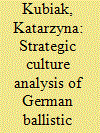

|
|
|
|
|
| Summary/Abstract |
Since the end of the Cold War, territorial ballistic missile defense (BMD) has played a key role in shaping relations between the U.S., NATO, and Russia. This article applies the concept of strategic culture to examine how Berlin rationalized and legitimized BMD and Germany's participation in the NATO BMD project. For Berlin, BMD served as a tool to strengthen NATO and held promise to paving the way to strategic partnership with Russia. With the current stalemate between NATO and Russia and the internal dissent within NATO over BMD's composition and role in its broader deterrence and defense posture, the German long-term strategic interest in BMD has lost relevance. Yet Berlin still has not established a new policy line on BMD. The article argues that the German cooperative strategic culture did not provide off-the-shelf alternatives that fit the changed geopolitical circumstances. It also did not adapt, but rather exhibited a prevalence for continuity.
|
|
|
|
|
|
|
|
|
|
|
|
|
|
|
|
| 14 |
ID:
170950


|
|
|
|
|
| Summary/Abstract |
Establishing German-Israeli Relations
The first public debate on the relationship of the West German state to Israel took place shortly after the foundation of the Federal Republic of Germany (Bundesrepublik Deutschland). A reparation agreement with Israel was pushed forward by German Chancellor Konrad Adenauer, who perceived the agreement as a moral means of restitution, but also as a signal to the outside world to rehabilitate Germany.
|
|
|
|
|
|
|
|
|
|
|
|
|
|
|
|
| 15 |
ID:
086981


|
|
|
|
|
| Publication |
2009.
|
| Summary/Abstract |
ON the eve of the first world war Leonard Schapiro, Aged Six, was on a train journey from Glasgow to Riga, during which a German official entered the carriage and, seeing the nanny chafing the little boy's feet, exclaimed. Cold feet, cold feet! Soon all Englishmen will have cold feet! The war that was soon to erupt was a war within a civilization, and also a war fought on the German side against the ascendancy of the dominant liberal idea of that civilization, an idea it associated above all with England.
|
|
|
|
|
|
|
|
|
|
|
|
|
|
|
|
|
|
|
|
|